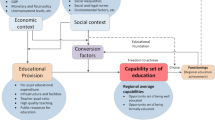Abstract
Over the past few decades, South Korea has made remarkable achievements in education despite many obstacles. Education, in turn, has played an important role in Korea’s achieving both economic development and political democracy. This article examines how South Korea expanded access to education and improved its quality. The article also identifies several tasks Korean education faces in the context of the new challenges of globalization and social polarization, and some of the broader policy implications that the Korean model of educational development has beyond South Korea.



Similar content being viewed by others
References
Adams, D., & Gottlieb, E. E. (1993). Education and social change in Korea. New York: Garland.
Brain Korea 21 (2012). Organization website. http://bnc.krf.or.kr/home/eng/bk21/aboutbk21.jsp.
Byun, K., & Jon, J. (2011, October). Quest for building world class universities: Lessons from Korea’s experience. Paper presented at the HEPRI-BK21 GGTRE International Symposium, Developing World-class Universities in the Asia Pacific Region: Policy Approaches for Capacity Building in Higher Education, Korea University.
Byun, S., & Kim, K. (2010). Educational inequality in South Korea: The widening socioeconomic gap in student achievement. Research in Sociology of Education, 17, 155–182.
Byun, S., & Park, H. (2012). The academic success of East Asian American youth: The role of shadow education. Sociology of Education, 85(1), 40–60.
Byun, S., Kim, K., & Park, H. (2012). School choice and educational inequality in South Korea. Journal of School Choice, 6(2), 158–183.
Byun, S., Schofer, E., & Kim, K. (2012). Revisiting the role of cultural capital in East Asian educational systems: The case of South Korea. Sociology of Education, 85(3), 219–239.
Chung, B. M. (2010). Development and education: A critical appraisal of the Korean case. Seoul: SNUPRESS.
Chung, B. M. (2011). Tomorrow’s Korean as an ideal of an educated person. Seoul: Hakjisa. (in Korean).
Im, Y. K. (2008). An impact analysis of university establishment regulations. Korean Journal of Educational Administration, 26(4), 147–167. (in Korean).
Jin, M. (2010). The link between education and work: Vocational education and training in Korea. In C. Lee, S. Kim, & D. Adams (Eds.), Sixty years of Korean education (pp. 546–581). Seoul: SNUPRESS.
Kaletsky, A. (2010). Capitalism 4.0. New York: Public Affairs.
Kim, B. (2010). The competitive power of higher education in Korea. In C. Lee, S. Kim, & D. Adams (Eds.), Sixty years of Korean education (pp. 582–618). Seoul: SNUPRESS.
Kim, J. H. (1983). Education for the whole person. Seoul: Seyung Publishing Co. (in Korean).
Kim, S. H. (2011, October). Instruction and assessment for creativity. Paper presented at the KEDI Seminar on School Management. Seoul: KEDI (in Korean).
Kim, Y. H. (1997). The contribution of education to economic development in South Korea. Journal of Economics and Finance of Education, 6(1), 31–63 (in Korean).
Kim, S., & Lee, J. (2003). The secondary school equalization policy in South Korea. https://pantherfile.uwm.edu/kim/www/papers/Equalization5.doc.
Lee, C. J. (2008). Education in the Republic of Korea: Approaches, achievements, and current challenges. In B. Fredricksen & J. P. Tan (Eds.), An African exploration of the East Asian education experiences (pp. 157–217). Washington, DC: World Bank.
Lee, C. J. (2011a, October). Development of education in Korea revisited. Keynote address at the 12th International Conference on Educational Research, Seoul National University.
Lee, C. J. (2011b, November). Expanding access to education in Korea during 1960–1980. Paper presented at the 4th High Level Forum on Aid Effectiveness, Busan.
Lee, C. J., Kim, S., & Adams, D. (Eds.). (2010). Sixty years of Korean education. Seoul: SNUPRESS.
Lee, C. J., Kim, S., Kim, W., & Kim, Y. (2010). A Korean model of educational development. In C. Lee, S. Kim, & D. Adams (Eds.), Sixty years of Korean education (pp. 53–106). Seoul: SNUPRESS.
Lee, C. J., & Song, K. (2010). The school reform policy initiatives of a new government. In C. Lee, S. Kim, & D. Adams (Eds.), Sixty years of Korean education (pp. 478–511). Seoul: SNUPRESS.
MoEST [Ministry of Education, Science, and Technology] and KEDI [Korean Educational Development Institution] (2010). 2009 education statistics. Seoul: MoEST and KEDI, (in Korean).
Mullis, I. V. S., Martin, M. O., & Foy, P. (with J. F. Olson, C. Preuschoff, E. Erberber, A. Arora, & J. Galia) (2008). TIMSS 2007 International mathematics report: Findings from IEA’s trends in international mathematics and science study at the fourth and eighth grades. Chestnut Hill, MA: TIMSS & PIRLS International Study Center, Boston College.
OECD [Organisation for Economic and Cooperation Development] (2008). Education at a glance 2008. Paris: OECD.
OECD (2009). Creating effective teaching and learning environments: First results from TALIS. Paris: OECD.
OECD (2010a). PISA 2009 results: What students know and can do—Student performance in reading, mathematics and science (Volume I). doi:10.1787/9789264091450-en.
OECD (2010b). PISA 2009 results: Overcoming social background—Equity in learning opportunities and outcomes (Volume II). doi:10.1787/9789264091504-en.
OECD (2010c). PISA 2009 results: Learning to learn—Student engagement, strategies and practices (Volume III). doi:10.1787/9789264083943-en.
Park, S. (1995). The changing conception of education in globalized times: From regulation to deregulation. In The Nara Policy Institute (Ed.), Educational reform in the era of consumer’s sovereignty. Seoul: Gilbut, (in Korean).
Park, H. (2010). Japanese and Korean high schools and students in comparative perspective. In J. Dronkers (Ed.), Quality and inequality of education (pp. 255–273). New York: Springer.
Park, H., Byun, S., & Kim, K. (2011). Parental involvement and students’ cognitive outcomes in Korea: Focusing on private tutoring. Sociology of Education, 84(1), 3–22.
Rychen, D. S., & Salganik, L. H. (2001). Defining and selecting key competencies. Paris: OECD.
Ryu, B. (2004). The living and culture of elementary school teachers. Seoul: KEDI (in Korean).
UNESCO (2000). The Dakar framework for action: Education for all: Meeting our collective commitments. Paris: UNESCO.
Author information
Authors and Affiliations
Corresponding author
About this article
Cite this article
Lee, C.J., Kim, Y. & Byun, Sy. The rise of Korean education from the ashes of the Korean War. Prospects 42, 303–318 (2012). https://doi.org/10.1007/s11125-012-9239-5
Published:
Issue Date:
DOI: https://doi.org/10.1007/s11125-012-9239-5




